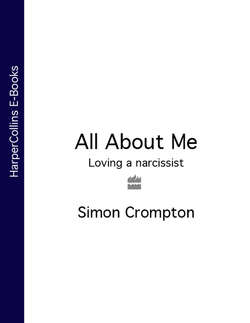Читать книгу All About Me: Loving a narcissist - Simon Crompton - Страница 13
NICE NARCISSISTS
ОглавлениеLet’s take a step back, and look at the results of those two checklists again. Many of you will have scored, say, seven on the first checklist, and two on the second. It doesn’t mean you’re engaged in a disastrous relationship. It may mean that your partner is extremely nice, with many redeeming features, but that he or she has some narcissistic traits that make life very difficult for you.
In fact, nice narcissists are a common breed – people who, for example, believe that they are driven by compassion, and may have been bolstered in that impression by others, but who within a relationship still expect the world to revolve around them. These types of narcissists can be tricky.
So, in contrast to our earlier examples, which have tended to concentrate on the more extreme end of narcissism, let’s look at how it manifested itself in a relationship that showed no outward signs of being unusual or destructive.
Andrew and Hazel have been married for eight years. Before that, they had been going out together for three. Prior to their marriage, and before the couple lived together, everything was a mad romantic whirl – impulse trips abroad (usually at Andrew’s instigation), sex on the beach (usually at Hazel’s), and nights of laughing, going to glamorous places, and gazing adoringly into each other’s eyes. When they married, things started to change. Andrew, a stockbroker, worked long hours, and Hazel noticed that when he wasn’t out ‘having a good time’ he became preoccupied with his work. She also had a high-pressure job at an advertising agency to hold down. But for all the pressures of her work, Andrew expected Hazel to take the brunt of the household chores, and started to get irate when Hazel reminded him that she was getting increasingly desperate and isolated.
‘It wasn’t until we started to live together that I realised there was just this expectation that his wants and needs should always come first,’ says Hazel. ‘I don’t think it was even a conscious thing on Andrew’s part. He was always very popular with people, and had this aura of personableness and of being kind. That was one of the things that drew me to him. But there was something deep inside him that just couldn’t get outside of his head and into mine, to see how hard he was making it for me when, say, he just expected to be able to be out as late as he liked with his friends after work.
‘Things got so much worse when we had our first son, Joe, because the pressures on me obviously got considerably worse, especially after I returned to work and Joe went to nursery. We had constant arguments. I think Andrew genuinely wanted to try to be sympathetic – because that’s the image he had of himself. But when it came down to it, he had no inner mechanisms for thinking of how I felt or reminding himself that every time he put his own wishes first – from what to watch on television, to where we went on holiday, and who picked up Joe in the evenings. It was as if he lived in a fantasy world where everything was fine, and he could do whatever he wanted, and all those messy, difficult bits of life would just get done.
‘It wasn’t just a matter of me being unsupported. He was constantly demanding more from me, even though I couldn’t cope as it was. If I was trying to fix Joe’s food, he’d start having a go that we weren’t feeding the child properly, or that I left the kitchen in a tip and it was unhygienic. And then he’d go on about feeling unsupported himself, about how I never made love to him any more, or asked him about his work, or made a fuss of him on his birthday like I used to. Sometimes he used to deliberately bug me to gain attention – for example, bombarding me with emails when he knew I was up against a deadline on a really important piece of work.’
The rows got worse and worse, and then were followed by weeks of silences as Hazel realised that no matter what she said, Andrew was incapable of empathising with her, or remembering that he had to fundamentally change his behaviour to make her life more bearable. Eventually, she got Andrew to agree to them both going to a marriage counsellor.
‘It was hard for both of us, but I think it was especially hard for Andrew because he was having to wake up to something that was very fundamental to his make-up – his lack of empathy – which conflicted significantly with the image of himself he’d built up since his childhood of being kind and considerate. Things are much better between us now – but it’s not that Andrew’s changed. He’s just more aware of what he tends to do, so when I pull him up over stuff, he can’t just dismiss it any more. And he makes a real effort not to make himself the centre of attention any more. He knows there’s a certain jealousy thing going on with Joe, that’s he’s competing with him for my attention, and he hates that and is really working on it.’
This is how a lot of men behave. It’s not pathological, and it’s not terribly dramatic. But it is something that can be described as narcissistic.
